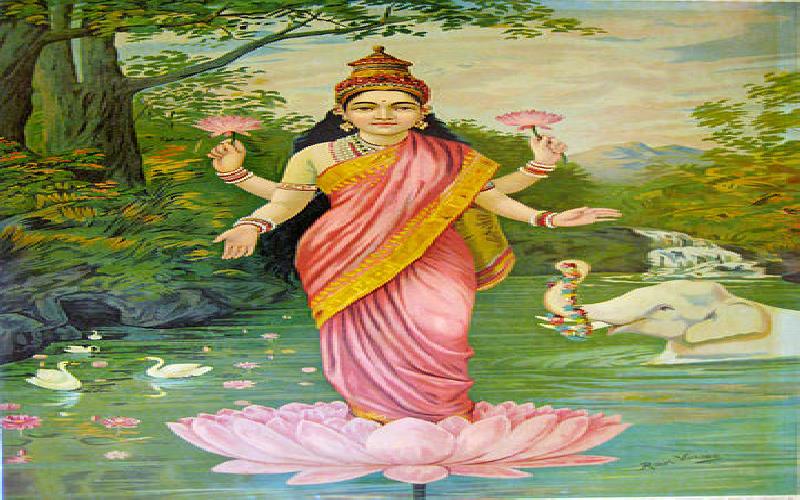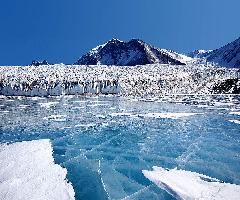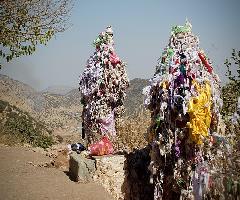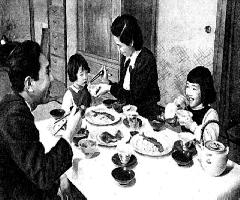The myth of million gods and goddesses in India has not only confused foreigners about Indian religious philosophy, but sometimes even stupefied many uninformed Indians. The so called gods and goddesses are nothing but different manifestation of the omnipotent and incomprehensible power of the Universe. These abstract concepts are based on rich philosophies with various differing schools of thoughts.
To understand the gods and goddesses in ancient India, one needs to be familiar with its religious philosophy and different schools of religious thought.
Concept of God in Ancient India
In Indian religious beliefs, often called 'Hinduism', the almighty god is defined as an
entity that is all pervading (it exists everywhere), all powerful (omnipotent), eternal (which has no beginning and which never ends), and which is beyond human comprehension.This is the common concept for the almighty god, irrespective of the name with which people address and pray to him, irrespective of the form in which they imagine him to be for the purpose of focusing their attention on him during worship, prayers and meditation, and irrespective of the path they follow to become closer to him.
Different Schools of Indian Philosophy of the Divine
The concept of God in this philosophy is also a result of the understanding and analysis of the many great philosophers of those times, and is thus more an indication and admission of ignorance rather than an assertion of superiority. Another important aspect of this philosophy is the fact that there are different schools of philosophical thoughts all of which are equally revered and respected, even though one of them may be more accepted than the other.
One school of philosophy considers God as omnipresent, and a part of everything. Thus the God as a creator is not different from its creation. In this philosophy (Advaitavad), the universe is a part of God, and so is everything that exists, though each of these things and beings is not god. Then every human soul (atma) has a temporary existence, and its ultimate fate is to get united with the rest, i.e. god (parmatma), a process called 'moksha' or 'nirvana'.
There is another somewhat different school of thought (vishishtha advaitavad) in which the creator is separate from the creation, but becomes one after nirvana.
Gods & Goddesses of Ancient India
Having understood the concept of God, it is equally important to understand the concept of Saakar, and Niraakar.
Devotees follow two forms of perception of god to worship him. One is to focus on God without any form (nirakar bhakti) - where the God is perceived like all pervading, all powerful and omnipotent entity. The other is to worship God in a perceivable human like form (sakar bhakti) - this is a method that became more and more popular over the centuries because of the ease with which the worshiped entity could be shared and discussed together by a large mass of mankind.
In different times, and different places, God began to be worshiped in different forms, amidst the realization that it is only the form that is changing, the essence remains the same. So even though the God is the same, he is known and called by many names, worshiped in many forms, and depicted as different entities.
The Holy Trinity
The three primary forms in which god is conceptualized in Hindu tradition are BRAHMA, the creator, VISHNU, the preserver and SHIVA, the destroyer. Together, they form the holy trinity.
Among them, Brahma is the least worshipped, and there are very few temples devoted to him. It is said that Brahma fell into
Vishnu is worshipped in his original form as well as nine incarnations - avatars or mortal forms in which he came to the Earth.
Shiva is also equally worshipped, and though not as incarnations, he is also depicted in many different forms and poses.
Nature as Deities in Hinduism
AGNI
In the earliest phase of the civilization, AGNI or fire was the most revered among the deities. Looking at the significance of fire for the ancient civilization, it was but expected that fire was the centre of man's fascination. More important in this regard, were the social customs. In Indian society, there was tradition of YAGNA, or sacred project. Every major action undertaken by the members of the society or neighborhood was considered a sacred project, and the fruits of the labor were distributed or enjoyed together by the people, in the evening as they sat around a fire, cooking their food, saying prayers and thanking god and nature for helping them in the success of their endeavor.
INDRA
Indra is considered the Lord of rainfalls. Given the importance of rain in success of agriculture as well the destruction it can cause in many states in India even today, it is obvious that for the ancient people, rains were a matter of life and death. India has one of the most peculiar monsoon seasons, and around 90% of its rainfall is received in the three months of monsoon. A delay of few weeks can cause havoc on the life of the people. Thus, Indra is the most important of deities considered the king of deities. The earliest religious text places it on the top, but it does not treat him as infallible. In fact, he is also described as having weaknesses of character, for which he had to suffer.
VAYU
Vayu of air is another deity that is considered sacred in ancient Indian literature, and worshipped as a deity. This air-god is considered benevolent, and known to a very large extent as the father of HANUMANA, the friend of Lord Rama in the epic story of RAMAYANA, who is considered an incarnation of god and commonly worshipped in India today.
VARUN
Varun or water is also considered a deity and worshipped, but is considered less important than Indra who controls rains. This, in a way reflects the greater anxiety attached by ancient Indians to rains rather than surface water.
OTHERS
In the four VEDAS, the ancient sacred Indian texts, written in Sanskrit, around 5000 years ago, there are innumerable hymns praying the various elements of nature. Many of them are considered deities and worshipped, while many others are simply recognized as very significant and thanked for blessing this world and mankind by their existence.










